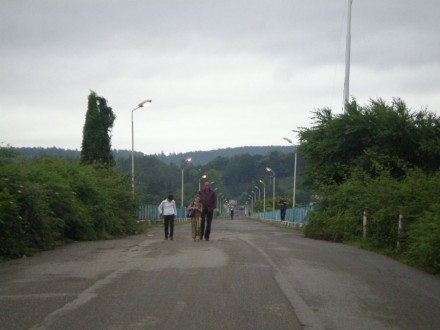
TBILISI, DFWatch–Georgia has jailed 51 persons over the last nine years for entering Abkhazia or South Ossetia from the wrong direction. The ombudsman now calls for a review of the law.
Georgia’s Law on the Occupied Territories makes it a crime to enter the two regions through crossing points that are controlled by the separatists. It is only legal to enter the two breakaway territories from the Georgian-controlled checkpoints.
When it comes to Abkhazia, a former Soviet holiday destination with palms and sand beaches, it’s also illegal to arrive by sea without permission from Tbilisi. The only legal way to enter, is across the bridge over the river Inguri. There are two smaller crossing points further upstream, but they were recently closed by the Abkhaz side.
Violating the law carries the risk of a fine or up to five years in prison. Although not everyone taken in violation of the ban are held to account, nearly four hundred people have so far been charged with entering one of these disputed regions the wrong way since the law on occupied territories was passed in 2009.
The law was a way for Georgia to toughen its policy of non-recognition after the 2008 war, which led to Russia recognizing the regions as independent countries and placing military bases there.
A new report from the Georgian ombudsman’s office shows that 395 persons have been held in violation and faced criminal charges between 2009 and 2016, which typically happens the next time the person enters Georgia proper and his or her passport contains stamps from the breakaway territories.
51 of the violators were sent to prison; the rest were issued a fine.
“Based on information from the Venice Commission under the Council of Europe, a large share of the detained persons are foreign sailors, who, apparently, were not aware of the situation in Georgia and of the existence of this law. In addition, the Law is often violated due to force majeure (bad weather),” the report reads.
The ombudsman now calls on the government to review the law. It contains ‘problematic issues’ and needs to be liberalized, he argues in the report.
In 2013, the government proposed a draft , which does away with criminal liability for persons entering the breakaway territories from prohibited directions for the first time. However, the law passed only the first hearing and never made it onto the books.
Violating the procedures for entering the breakaway territories should not be a criminal but administrative offense, the ombudsman argues.
The document also recommends making exceptions for situations in which entry into the breakaway regions should not be regarded as illegal. It says that a special entry permit should be issued if this trip serves Georgia’s state interests, is part of work toward peaceful resolution of the conflict or for de-occupation or humanitarian purposes.
In autumn of 2016, parliament resumed its review of the bill. According to the amendments, punishment for violation of the law will be an administrative offense, instead of criminal liability. The same action committed repeatedly will be deemed a criminal offense, which, unlike confinement, will be punishable by a 400 lari (USD 150) fine.
The report says one of the reasons people end up violating the law and crossing the border the wrong way is limited access to information. Documentation providing application form and the list of required documentations are not available either on the Foreign Ministry website, or on the website of the State Security Service.
Since August 2015, only two entrance permits have been issued by the agency out of ten applications, based on information from the State Security Service.
“Information about the procedure and application form for a special permit, as well as about the documents to be submitted – as provided by law – should be easily available to every person wishing to enter the occupied territories with a special permit, or to obtain a special permit after entry,” the report says.
In his report, the Public Defender expresses concern about identity documents illegally issued by the secessionist authorities to people living in the conflict zone, especially those who were born since the wars in the early 1990s.
The Law of Georgia “On occupied Territories” does not recognize the de facto government in the occupied territories, and, therefore, it does not consider documents issued by them as legally valid.
The ombudsman, or public defender, also calls on the government to make it easier for residents in the breakaway territories to get Georgian citizenship. Most of them have Russian citizenship today.
“The Public Defender believes that the government should work out an effective mechanism, so that residents of the occupied territory can obtain the Georgian citizenship IDs and legally valid documents in a relatively simple way, thus they would be able to make use of the services offered by the state” reports says.
Three of Georgia’s regions – two of which remain as unsolved conflicts – broke out and declared independence in the wake of the dissolution of the Soviet Union. Disputed borders are also a fact of life in other parts of the Caucasus, such as Nagorno-Karabakh, which last year had the most violent flareup of violence in two decades.
The sides in each conflict engage in a strategic games of recognition and non-recognition, changing the words of the language and exploiting international attention for their own perceived benefit – and against the other side.
When the European Parliament recently voted in favor of offering a visa-waiver system for Georgian citizens, the government of Georgia seized on this by saying that also inhabitants of the breakaway regions could benefit from visa-free travel to Europe, but only if they acquired Georgian passports first. The de facto authorities of Abkhazia and South Ossetia – where the population are predominantly Russian passport holders – rejected the offer as an attempt to manipulate them.

